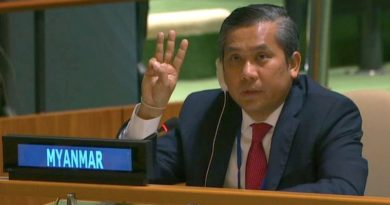ASEANEWS HEADLINE: ‘Russia backs ICC exit’ – By Manila Standard, Thursday, March 22, 2018
Russia backs ICC exit
Moscow scoffs at tribunal’s approaches
RUSSIA’S ambassador to the Philippines said Wednesday he empathized with the decision of President Rodrigo Duterte to withdraw the country’s membership in the International Criminal Court due to its “highly politicized” activities.
In an interview on the ANC News channel, Ambassador Igor Khovaev said his country, too, withdrew from the Rome Statute, the treaty that established the ICC, which was used to pressure “selective governments [and] selective countries.”
“We cannot accept certain approaches. That’s why my country decided to withdraw from the Rome Statute. I understand why your country took the same decision. It’s up to the Philippine government… [and] society to make assessments… But for us, we respect it,” Khovaev said.
Moscow initially signed the Rome Statute in 2000, but did not ratify the document and later withdrew from the ICC in 2016.
Russia opted to withdraw from the ICC after the tribunal published a report classifying Moscow’s annexation of Crimea from Ukraine as an occupation.
For her part, US Embassy Press Attaché Molly Koscina declined to comment on Duterte’s decision, saying it was an internal matter for the Philippines even as she stressed the importance of cooperation with the tribunal.
“We are aware that President Duterte made the decision, made this call, but we are also aware that it takes a year for the withdrawal to take effect so there are many opportunities for greater conversations,” she said, in the same television interview.
Koscina acknowledged that Washington is also not a signatory to the Rome Statute but she said it continues to work for rule of law and the ability of the tribunal to continue its work.
.jpg)
Aside from pulling out of the ICC, Duterte said he would convince other countries to do the same.
He called the ICC a project “sponsored by the European Union,” which he has criticized for interfering in the Philippines’ domestic affairs.
The ICC announced last month that it was opening a preliminary examination into possible crimes against humanity over the alleged extrajudicial killings in the Duterte administration’s anti-drug war.
On Wednesday, Duterte insisted the ICC can no longer conduct its preliminary examination.
“The ICC has no jurisdiction over me because the Rome Statute which created the court is not even a valid law in the Philippines,” Duterte said during the League of Municipalities’ General Assembly.
The President argued that the treaty did not take effect in the Philippines because the previous government failed to publish it in the Official Gazette or in a newspaper of general circulation—a requirement of all laws.
He said ICC cannot continue the investigation because they have no basis.
“They say, we can continue with the investigation. Based on what?” the President said. “Why are you here? What’s your power? What vests you? The treaty? The treaty was not published. When it is not published, it is as if there is no law at all. It’s that simple.”
The ICC has started a preliminary examination on the charges filed by lawyer Jude Sabio against Duterte in connection with the administration’s campaign against illegal drugs.
Duterte argued that the Rome Statute, which created the ICC, is considered “criminal law” that must be published before it can be effective and enforced in the country.
At the Palace, chief legal counsel Salvador Panelo said it was unfortunate that Filipinos working in the ICC are siding with organizations that threaten the sovereignty of the Philippines.
Panelo issued the statement after the ICC criticized Duterte’s reasons for pulling out of the tribunal as “a litany of poorly though-out pseudo-legal arguments and self-serving statements that focus on President Duterte’s fear and resentment to face the investigation.”
The Palace has criticized the ICC for disregarding the principle of complementarity, which says it can only step in if local courts are unable or unwilling to prosecute the cases.
“The Philippines was induced to conclude the Rome Statute in the belief that the principle of complementarity will be upheld only to find out later that it will not give due regard to the said principle. The Philippines would not have signed up for the Rome Statute if it knew from the beginning that the ICC will just later renege on its obligations found in the said statute,” Panelo said.
“The ICC should have immediately dismissed this case if only it was prudent enough to understand the situation in our country. Fraud in entering into international treaties or agreements is not a ‘pseudo-legal argument’ as the ICC asserts,” he said. / posted March 22, 2018 at 03:10 am by Rey E. Requejo


 ack
ack








All photographs, news, editorials, opinions, information, data, others have been taken from the Internet ..aseanews.net | [email protected] / For comments, Email to : Aseanews.Net | [email protected] | Contributor:-









